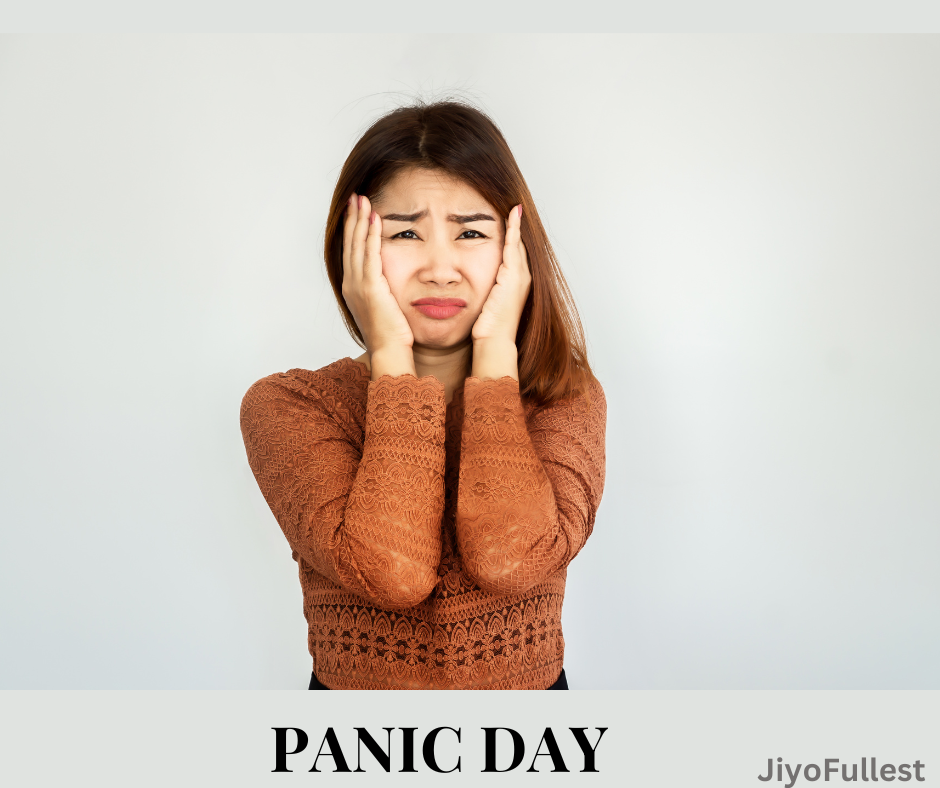Panic Day, observed annually on March 9th, is an occasion that encourages us to confront our feelings of panic and anxiety. As we explore the history of Panic Day, delve into coping strategies, and discover ways to celebrate, let’s embrace the chaos and find moments of calm amidst the storm.
Table of Contents
ToggleThe History of Panic Day:
Panic Day’s origins are somewhat obscure, but its purpose is clear—to acknowledge and address the moments of panic that arise in our lives. It’s believed that Panic Day emerged as a response to the increasing stress and anxiety prevalent in modern society. By dedicating a day to acknowledge and manage panic, individuals are encouraged to prioritize their mental well-being.
Coping Strategies for Panic:
- Deep Breathing Exercises: Take slow, deep breaths to calm the nervous system and reduce feelings of panic.
- Mindfulness and Meditation: Practice mindfulness to cultivate a sense of calm and clarity amidst chaos.
- Seeking Support: Reach out to friends, family, or mental health professionals for support and guidance during times of panic.
- Physical Activity: Engage in regular physical activity to reduce stress and anxiety levels and release pent-up tension.
How to Celebrate Panic Day:
- Self-Care Rituals: Dedicate time to indulge in self-care activities that promote relaxation and well-being. Take a soothing bath, pamper yourself with a massage, or spend time in nature.
- Connect with Loved Ones: Reach out to friends and family members to share your experiences and seek comfort and support. Strengthening connections can help alleviate feelings of isolation and anxiety.
- Practice Gratitude: Take a moment to reflect on the things you’re grateful for. Practicing gratitude can shift your focus from panic to positivity and resilience.
- Creative Expression: Engage in creative activities such as writing, painting, or playing music as a means of self-expression and emotional release.
Conclusion:
As we observe Panic Day, let’s acknowledge the reality of panic and anxiety in our lives while embracing strategies to cope and find moments of calm. By prioritizing our mental well-being and seeking support when needed, we can navigate through life’s challenges with resilience and grace. Let Panic Day serve as a reminder to embrace the chaos and find peace within ourselves.
FAQs about Panic Day:
Q1: What is Panic Day?
A1: Panic Day is observed annually on March 9th. It serves as a reminder to acknowledge and address feelings of panic and anxiety that may arise in our lives.
Q2: Why is Panic Day celebrated?
A2: Panic Day is celebrated to raise awareness about the prevalence of panic and anxiety in modern society and to encourage individuals to prioritize their mental well-being.
Q3: How did Panic Day originate?
A3: The origins of Panic Day are somewhat obscure, but it is believed to have emerged as a response to the increasing levels of stress and anxiety experienced by people in contemporary life.
Q4: How can I participate in Panic Day?
A4: You can participate in Panic Day by acknowledging your feelings of panic and anxiety, practicing self-care, and seeking support from friends, family, or mental health professionals.
Q5: What are some common signs of panic?
A5: Common signs of panic include rapid heartbeat, shortness of breath, trembling, sweating, and feelings of impending doom or loss of control.
Q6: How can I cope with feelings of panic?
A6: Coping strategies for dealing with panic include deep breathing exercises, mindfulness and meditation, seeking support from loved ones or professionals, engaging in physical activity, and practicing self-care rituals.
Q7: Is it normal to experience panic?
A7: Yes, it is normal to experience moments of panic and anxiety, especially during stressful or challenging situations. Acknowledging and addressing these feelings is an important step towards managing them effectively.
Q8: How can I support someone experiencing panic?
A8: You can support someone experiencing panic by listening to their concerns without judgment, offering reassurance, and encouraging them to seek professional help if needed. Providing a calming presence and practicing empathy can also be helpful.
Q9: Are there resources available for managing panic and anxiety?
A9: Yes, there are many resources available for managing panic and anxiety, including therapy, support groups, self-help books, online resources, and mental health hotlines.
Q10: How can I raise awareness about Panic Day?
A10: You can raise awareness about Panic Day by sharing information about the day on social media, organizing events or discussions about mental health and coping strategies, and encouraging others to prioritize their emotional well-being.
Recent Posts
- Lucky Colors for Money by Zodiac Sign: What to Wear to Attract Financial Luck
- How to Glow up From Inside Out : 10 Tips, Checklist
- How to Improve Focus and Concentration Naturally
- Stress is Good: Change Your Perspective to Manage Stress in 2026
- How to Master Attention to Detail for Productivity, Focus & Emotional Wellbeing

